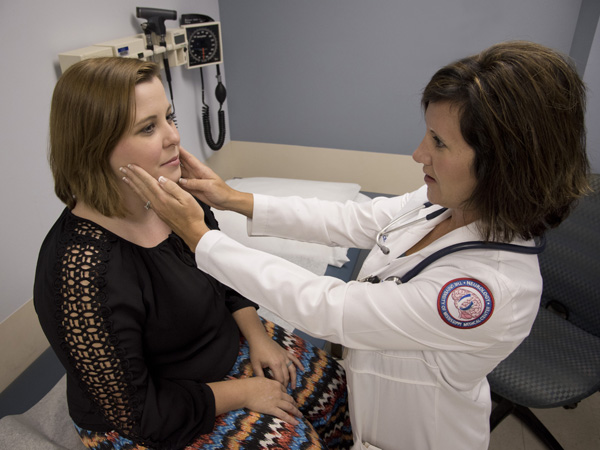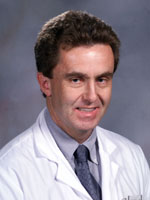Specialty headache care gives patients hope

Published in News Stories on August 03, 2015
Since she was 14, Kristen Johnson has suffered from debilitating migraine headaches brought on by stress, a crushing pain that all but shuts down her very existence.
"Depending on how severe it is, most of the time, it's pretty debilitating," said Johnson, a billing specialist at the University of Mississippi Medical Center's business office in Clinton. "You're not able to see straight. It pretty much stops your life when you have one."
But thanks to the care she's receiving through the Medical Center's specialized practice of headache medicine, Johnson's headaches have decreased from three to four a week down to three to four a month. Their duration and severity also have significantly improved, Johnson said.
She's one of the many patients served by the Department of Neurology who are getting relief, not through the common use of narcotic medications, but other therapies that are less harsh and more productive in the long run.
It's not always easy to work with patients who live with constant headache pain, said Dr. John Norton, professor of psychiatry and one of only two practicing physicians in Mississippi who have earned subspecialty board certification in Headache Medicine from the United Council for Neurologic Subspecialties.

Norton
"Typically, headache medicine covers migraines and cluster headaches that can be horribly painful and agonizing," he said. "People know that it's often going to happen in the spring, and that they last for about an hour. People literally have jumped out of windows with them because they are so painful. These are chronic headaches that they might have every day."
Many neurologists see patients with headache disorders, but it's not their specialty, Norton said. "I see the overlap in neurology and psychiatry. I've always had that interest, and sometimes you want to have more of an expertise in that one area."
Even for patients who have headache pain that makes life miserable, Norton said, he generally does not prescribe narcotics before trying other medications and therapies that aren't addictive. That's where neurology and psychiatry often merge, he said.
"Many migraine patients get put on narcotics or anti-inflammatory drugs in excess," he said. "It's hard treating this population. A lot of them get depressed, isolate themselves, and have trouble being employed. Some of them become drug dependent."
He instead first offers patients forms of integrative medicine in which a health-care provider focuses not just on the person's pain, but on their overall well-being and therapies that can also help them mentally and physically.
"Much of it deals with lifestyle changes, appropriate medications, and the physician commiserating at some level with the patient," he said. "It's difficult to have symptoms that you can't look at, like a broken leg or cancer."
That means "pain is a hard thing to talk about, unless you have a context for it," Norton said. "You don't have to cure everything right away, but some doctors feel the pressure to fix it in 30 seconds when someone has had the problem for 10 years.
"The patient is frustrated. I tell the patient, 'I'm frustrated for you, too, but we'll get there.'"
In Johnson's case, family nurse practitioner Liz Williams in the Department of Neurology is giving her Botox injections to ease her chronic migraines. Williams gives Johnson 31 injections, all at once, every 12 weeks. The shots can lessen the frequency and severity of the headaches, and often, their duration. Johnson felt relief after her second round of injections.
"It's all over your head, starting with your face, behind your ears, down your neck and into your shoulders," Johnson said of the injections. "I've done it six times, and I can feel when it starts wearing off. Headaches do every now and then sneak up on me, but I can usually feel it coming on and avoid it if I can with other medications."
It's not well understood why Botox, or botulinum toxin, alleviates headache pain, but it's believed that it can inhibit the central pain processing systems that generate migraine headaches. Botox was licensed specifically for treatment of chronic migraines in 2010.
That treatment is not for every patient, Williams said. "The patient has to have a diagnosis of chronic migraines, and they must meet certain criteria," she said. "They must have been on two to three preventative medicines that failed. They must have 15 or more headaches a month lasting longer than four hours in duration."
They also must have tried two abortive medications designed to stop a migraine once it starts, or when a patient feels one coming. "It's really affecting their quality of life," Williams said of her patients, some who have suffered headaches lasting longer than four hours. "Some of the patients who get the Botox injections can go back to work afterward. It's definitely effective."
"I went to Liz because everything else had failed," Johnson said. "We were pretty much at a standstill without trying Botox."
The goal, Williams said, is that patients will be able to taper off their other headache medications, usually after the second set of Botox injections. "We started this in December 2013, and some of those patients are still getting it now because they find it effective," she said.
Norton gives special attention to areas of his patients' everyday lives that are suffering because of their headache disorders, and sometimes, because they're too dependent on narcotics that in the long run won't make their headaches go away. "Members of a family might say, 'Mom's in pain all the time, so she doesn't hang out with us.' The kids can become latchkey kids. The marriage can suffer," Norton said. "It can affect the entire family. There are a lot of things you have to pay attention to with that type patient."
And if the patient is suffering from a secondary form of headaches - perhaps from a stroke, traumatic injury or chronic neurological disease such as multiple sclerosis - "we need to find the underlying cause and treat it," Norton said.
At times, he said, he must detox patients from the medications they're using or overusing. "Sometimes, they must be admitted to the hospital, and you try to put them on a more traditional migraine medicine. Over time, they do better - but the hard part is, when you're trying to detox them, they are going to feel worse."
Norton holds board certification in Neurology, Psychiatry, Geriatric Psychiatry, Behavioral Neurology and Neuropsychiatry, Addiction Medicine, Advanced Psychopharmacology, Psychosomatic Medicine and Traumatic Brain Injury Medicine.
But being board certified in Headache Medicine, he said, "means you are really willing to dedicate yourself to it. You want to give your patients more of an understanding of their headaches."
Doctors who are certified in Headache Medicine "have taken extra time to study and pass the examination, which to the patients, should demonstrate that they met rigorous standards in the subspecialty," said Todd Bulson, senior certification manager for the United Council for Neurologic Subspecialties. "They have also shown that they are concerned with being current in the practice of Headache Medicine."
"As a specialist, you must have an appreciation for the depth of despair and pain that these people have," Norton said. "That can help them a lot. You need to be familiar with the wide array of treatment options and medication. You have to go the distance for your patient."
Do you want to see one of UMMC's headache medicine specialists?
To make an appointment, call the UMMC Department of Psychiatry and Human Behavior at 601-984-6925.
Photos
 | High Resolution Medium Resolution Low Resolution |


